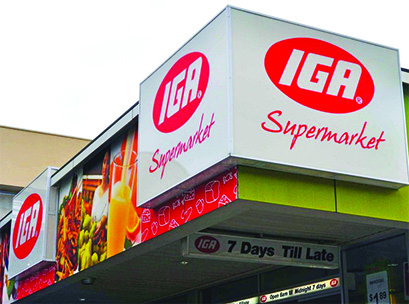There was no doubt a lot more Christmas cheer at Metcash in 2020 than there was the year before, with a rebound in fortunes for the first half of the 2021 financial year. Metcash joined the financial bonanza of its chain competitors Coles, Woolworths, Aldi and Costco, as most non-food retailers were forced into store lockdowns to curb the spread of Covid-19 transmission. However, the Metcash results for the half-year to October 31 were arguably more significant, given the pre-coronavirus challen
hallenges the grocery and hardware wholesaler faced.
In recent years, Metcash has struggled for growth. It incurred operating losses while attempting to diversify and expand its business through a string of acquisitions in automotive aftercare, before divesting that business to refocus on its core food and liquor operations.
In 2019, the company lost a significant chunk of its business in South Australia when one of its largest customers, the independent chain Drake Supermarkets, established its own distribution centre.
The bad news was compounded by 7-Eleven’s decision not to renew a supply contract with Metcash when the agreement expired in August 2020. The launch of Co-Operative Supermarkets Australia, a buying group that sources products direct from suppliers, also delivered a blow.
The loss of the Drakes and 7-Eleven businesses represented a $620 million dent in sales for the wholesaler, which also faced competitive challenges in 2019 from Amazon and Kaufman, before the German hypermarket chain pulled the plug on its Australian investment.
To add further potential misery for Metcash, Steven Cain — who had boosted sales in the IGA food business from 2015 to 2018 and knew all of the independent supermarket sector’s strengths and weaknesses — had become Coles CEO, after Wesfarmers divested the company.
The challenges for the publicly-listed Metcash prompted Credit Suisse analyst Grant Saligari to radically suggest the company consider divesting the food wholesaling operations that have been core business and the major revenue and earnings drivers from its launch.
Saligari’s proposition was based on the wholesaler’s declining market share, the fracturing of its customer base, and increasing competition in the grocery category.
Metcash CEO Jeff Adams rejected the spin-off proposal, believing the company’s investment in stores and reduced operational overheads from cutting costs would rebuild sales and earnings.
Bolstered by an equity raising and the initial positive revenue boost of Covid-19 for the supermarket, liquor and hardware retail categories, Metcash actually increased its sales for the 2020 financial year. Underlying EBIT for the group was $324.2 million, a roughly $12 million improvement on the previous year.
The writedowns resulted in a reported loss for the FY2020 of $56.8 million, a reasonable result in the context of the challenges confronting the business.
However, the rebound in terms of sales growth and restored profitability in the first half of the current financial year is impressive, given the revenue loss of the Drakes and 7-Eleven contracts materialised in this period.
With Covid-19 restrictions hampering retail sales throughout Australia, Metcash joined its supermarket rivals in what Adams described as “a standout first half”, with group revenue soaring by 12.2 per cent for the six months to October to $7.1 billion.
The red ink of the previous financial year and particularly a first-half loss of $11.6 million in FY2020 was completely eradicated as Metcash posted a $125 million profit for the latest half.
Adams reported increased foot traffic in stores and bigger average basket sizes as consumers responded to marketing campaigns to shop locally.
All of the Metcash businesses reported strong like-for-like sales growth and improved earnings and margins, while Metcash continued to work to a strategy that encompasses investment in new stores and refurbishments as well as distribution centres, including a new purpose-built facility in South Australia to counter the Drake challenge.
Adams indicates Metcash is well-placed to invest in growth opportunities after recently acquiring Total Tools as a bolt-on to its hardware division headlined by the Mitre 10 and Home Timber and Hardware brands.
The hardware channel increased sales by 20.6 per cent in the half-year to $1.26 billion, boosted by strong DIY consumer purchases, while revenue for the liquor division jumped 14.3 per cent to $2 billion and food by 9.5 per cent to $4.8 billion.
Adams has indicated early results for the current half of the year have continued to show strong growth, although the businesses will cycle against high Cobid-19 driven sales increases in the months of March and April last year.
In any event, Metcash has emerged from a difficult period in a stronger position and with the opportunity to consolidate the gains made courtesy of the Covid-19 retail market disruption and some astute management.
The immediate threat to Metcash would now appear to be in the liquor division, with Coles yet again attempting to improve its liquor business, and Woolworths expected to revisit its deferred divestment of Endeavour Group with its flagship Dan Murphy’s chain.







